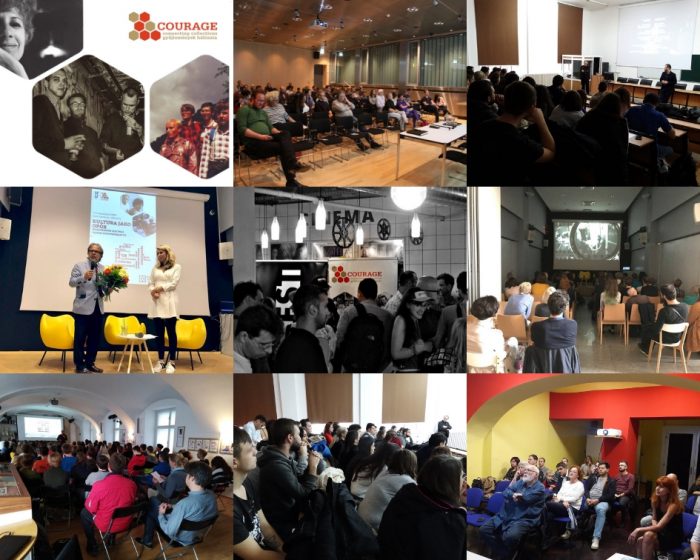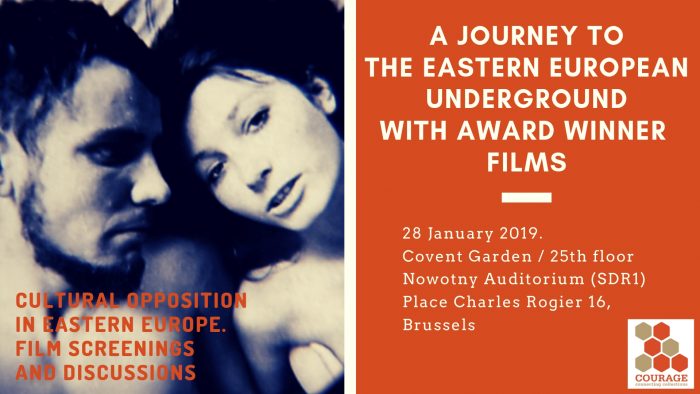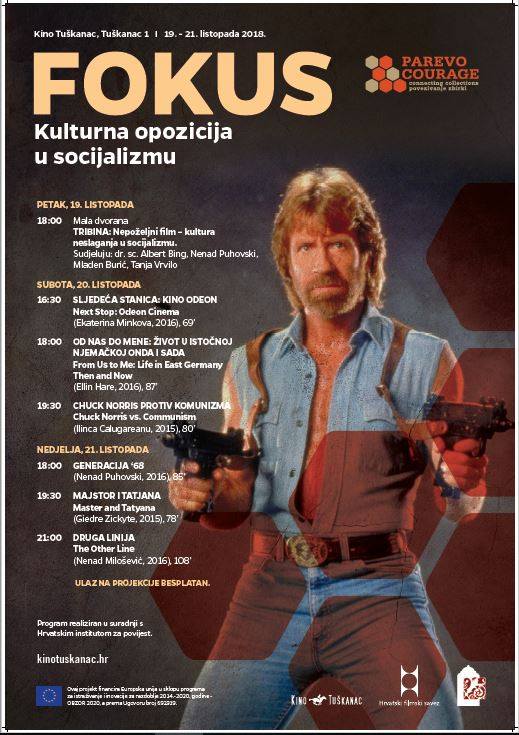COURAGE-PAREVO međunarodni filmski festival
19.-21. listopad 2018., Zagreb
Kino Tuškanac (Tuškanac 1)
U sklopu Mjeseca kulturne opozicije bit će predstavljeni najvažniji rezultati trogodišnjeg rada EU projekta “COURAGE-Kulturna opozicija: razumijevanje kulturne baštine neslaganja u bivšim socijalističkim državama” Hrvatskog instituta za povijest. Glavni cilj projekta bilo je otkrivanje različitih zbirki mnogobrojnih dokumenata i predmeta koji su u javnim institucijama ili privatnom vlasništvu svjedočili o “kulturnoj opoziciji”, odnosno o kulturnim i društvenim praksama raznih skupina i pojedinaca koje su izražavale kritičko neslaganje s komunističkim režimom i njegovom kulturnom politikom. Kino Tuškanac se priključuje filmskim festivalom od 19. – 21. 10. projekcijama filmova koji govore o tematici kulturne opozicije u vremenu socijalizma, kao i tribinom “Nepoželjni film – kultura neslaganja u socijalizmu” u kojoj sudjeluju Albert Bing, Nenad Puhovski, Mladen Burić, Tanja Vrvilo. Tribina se održava u maloj dvorani kina u petak, 19. 10. u 18 sati.
Izbor projekcija filmskog festivala organiziran je u suradnji s Hrvatskim filmskim savezom i kinom Tuškanac.
Ulaz je besplatan. Svi su titlovi na hrvatskom jeziku.
Counterculture, Dissent and Cultural Opposition in the Former Socialist Countries in Eastern Europe
COURAGE presents a cross-Europe documentary film festival series.

Stops of the Film Festival:
Budapest, 1-2 June 2018
Prague, 30 Sept-5 Oct 2018
Warsaw, 7-9 Sept 2018
Greifswald, 16-24 Oct, 2018
Zagreb, 19-21 Oct 2018
Bratislava, 7-10 Nov 2018
Bucharest, 16-17 Nov 2018
Film screening in the building of the European Research Council in Brussels:
A Journey to the Eastern European Underground with Award Winner Films.
Brussels, 28 January 2019

Trailer of the Film Festival:
FILMS
Nenad Puhovski │ Generation ‘68 │ 2016 │ 85 min │ HRV
Homage to a generation. The creator still shares the youthful enthusiasm of his generation, and he nurtures the idea of a revolution that will change the world. A revolution that remains “realistic and demands the impossible”. The Croatian film poses the question: how did the events of the era affect ordinary lives and society, and it shows what later generations can do with this legacy.
Stephan Coates & Paul Heartfield│ Roentgenizdat│ 2017 │ 25 min │ RUS/USA
Cold War era Leningrad: Soviet Russia has declared jazz, rock ‘n’ roll and other genres of music illegal, but the people have responded. Giving blood every week to earn enough money to buy a recording machine, Rudy Fuchs began copying forbidden records to be sold on street corners by shady dealers…
Mirosław Dembiński│ Orange Alternative│ 1988 │ 22 min │ POL
In 1982, graffiti images of orange dwarfs appeared on the walls of buildings in Wrocław. They “migrated” to other cities too. These dwarfs emerged as the symbol of the countercultural formation “Pomar Alternativa” (Orange Alternative).
Miroslav Janek │ Olga │ 2014 │ 84 min │ CZE
The police couldn’t break her, the castle didn’t change her: the remarkable story of Václav Havel’s reluctant first lady. Olga was a key intellectual in the 1950s and 1960s, who read his husband’s texts with a critical eye, and supported him in the hardest times. The documentary sheds light on the era in which Olga lived and on Olga herself presenting her highly original thoughts and memorable way of speaking.
Mária Takács │ Hot Men Cold Dictatorships │ 2015 │ 88 min │ HUN
What was it like to be a gay man before the regime change? Where and how could one get to know others? Were gay men kept under surveillance by the system? How did groups of friends develop in the decades? How did the regime change usher in change, and how did gay movement rise in Hungary? To find answers to thee questions, four young gay men hit the road.
Nenad Milošević│ The Other Line│ 2016 │ 108 min │ SRB
Why were the most creative and progressive artists in Yugoslavia silenced? Why are they still silenced today? The answers presented in this film are the results of ten years of hard work. They show us the exceptional avant-garde art scene of Novi Sad (concept art, experimental music, poetry) which emerged during the late 1960s and 1970s as a cultural melting pot of innovative Yugoslav nonconformist culture.
Ellin Hare│ From Us to Me: Life in East Germany Then and Now│ 2016 │ 87 min │ UK
In 1987, a British film crew gained unprecedented access and was able to film everyday life inside the GDR – but only the side of life that the state let them see. 25 years after the fall of the Berlin Wall the crew returned to the places and people they had visited at the time to see how their lives have changed and how they recall the “workers’ paradise”.
Keith Jones│ Vinyl Generation│ 2016 │ 72 min │ CZE/USA
In 1980s communist Czechoslovakia an emerging generation took inspiration from alternative culture, including punk rock and the neo-avantgarde, to create their own worldview, politics, and, eventually, a revolution leading to regime change. 25 years later, this unique generational perspective, more relevant than ever, is explored for the first time.
Slavomír Zrebný│Footprints in the Snow│ 2015 │ 53 min │ SVK/CZE
Harmless tourists or enemies of the system? The documentary is an exciting inquiry into how forbidden literature was smuggled to Czechoslovakia under the communist dictatorship. Why did people put their own freedom at risk in order to help preserve the inner freedom of others?
Ekaterina Minkova│ Next Stop: Odeon Cinema│ 2015 │ 69 min │ BGR
Sofia, Odeon Cinema: a legendary place. The city’s only archive cinema opened in 1961. Who were the guests of Odeon over the course of its existence? How did film censorship work under communism? The documentary opens a window to the Bulgarian urban culture of the past six decades.
Eszter Turán & Anna Koltay│ BP Underground│ 2017 │ 52 min │ HUN
Budapest around 1989: concerts in stuffy basements and ruined “houses of culture” filled with sweaty youngsters in search of meaning in their lives. This film recalls the golden age of the Hungarian hardcore/punk subculture, and it asks what happened to this culture. How did the scene affect society, and what role did Budapest play in the history of punk? Which were the best bands, clothing shops, cultic pubs? What ideas did this environment creat and how have these ideas shaped thinking in Hungary up to the present day?
Andrzej Wolski│ Józef Czapski: Witness of the Century, 1896-1993│ 2016 │ 58 min │ POL
Painter and writer Józef Czapski was a towering figure of Polish exile. Once a follower of Cézanne, he witnessed the Russian Revolution, fought for the Polish case, was taken as a POW, and lived in post-war Paris, where he edited the most significant Polish émigré journal, Kultura. Take a journey through European history by learning about his extraordinary life.
Ilinca Calugareanu│ Chuck Norris vs Communism│ 2015 │ 80 min │ ROM/UK
The illegal importation of American action and religious films on VHS cassettes was a common practice in Romania during the Ceaușescu era. Since there was no official dubding, all the actors had the same voice. The most famous voice of these dubbed films was Irina Margareta Nistor, who was the voice in Romanian of an array of American stars. This film recreates the epoch’s depressing and, at the same time, sweet-and-sour atmosphere.
Rossen Elezov│ Colors of the Voice│ 2015 │ 88 min │ BGR
A polyphonic sound captivates listeners. But what if an acappella choral performance is the work of a single person – the great jazz singer Yildiz Ibrahimova? Through the dramatic twist and turns of her life and music, we see shocking footage of the expulsion of the Bulgarian Turks across the border and the tragedy of their ruined lives.
Giedre Zickyte│ Master and Tatyana│ 2015 │ 78 min │ LIT
A story about a rebellious genius of photography, Vitas Luckus, and his passionate love for Tatyana Luckiene. Vitas was an extremely colourful personality: he kept a live lion in his apartment and he was among the first to document the flawed realities of the Soviet Union. A story about love and infidelity, freedom and conformity, hope and frustration, lies and the search for truth.

